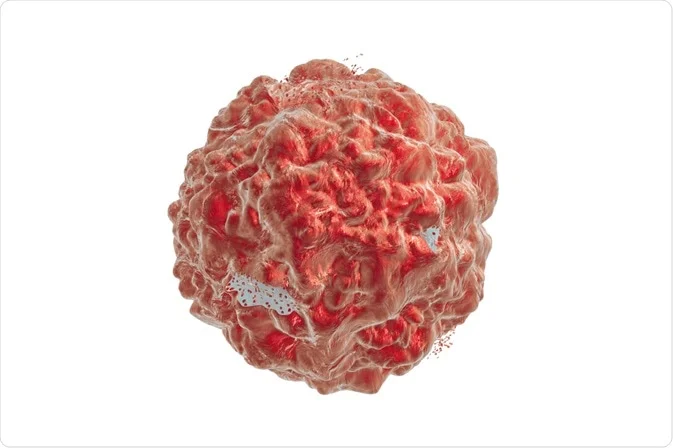Overview Of Tumor lysis syndrome
Tumor lysis syndrome (TLS) is a life-threatening condition that occurs when large numbers of cancer cells die rapidly, releasing their contents into the bloodstream. This leads to severe metabolic disturbances such as hyperkalemia, hyperphosphatemia, hypocalcemia, and hyperuricemia, which can result in kidney failure, arrhythmias, and other serious complications.
Symptoms of Tumor lysis syndrome
- -
- Nausea and vomiting Resulting from electrolyte disturbances and kidney dysfunction. -
- Fatigue and weakness Due to hypocalcemia, dehydration, and kidney failure. -
- Muscle cramps and twitches Caused by hyperkalemia and hypocalcemia. -
- Irregular heartbeat (arrhythmias) A result of electrolyte imbalances, particularly hyperkalemia. -
- Seizures Triggered by severe imbalances in potassium and calcium levels. -
- Decreased urination Indicative of kidney dysfunction due to uric acid buildup. -
- Confusion and restlessness Due to both metabolic abnormalities and electrolyte changes.
Causes of Tumor lysis syndrome
- -
- Cancer treatment: TLS is commonly triggered by chemotherapy, radiation, or immunotherapy, which rapidly kills tumor cells. These treatments cause the release of cellular contents into the bloodstream. -
- Hematologic malignancies: TLS is most frequently seen in cancers such as Acute Lymphoblastic Leukemia (ALL), Acute Myeloid Leukemia (AML), and Burkitt’s Lymphoma, where the tumor burden is high. -
- High tumor burden: Larger or more aggressive tumors are more likely to undergo rapid lysis after treatment, increasing the risk of TLS.
Risk Factors of Tumor lysis syndrome
- -
- High tumor cell turnover Tumors with rapidly growing cells, such as lymphomas and leukemia, are at high risk. -
- Pre-existing kidney dysfunction Reduced kidney function can worsen TLS symptoms and lead to complications. -
- Dehydration Insufficient fluid intake before or during treatment can hinder the body’s ability to eliminate waste products. -
- High baseline uric acid levels Elevated uric acid levels before treatment can increase the risk of TLS and kidney damage. -
- Intense cancer treatment Intensive therapies such as chemotherapy and radiation are more likely to induce TLS in high-risk patients.
Prevention of Tumor lysis syndrome
- -
- Risk stratification Identifying high-risk patients prior to treatment to initiate preventive measures. -
- Hydration and prophylactic medications Administering fluids and medications like allopurinol or rasburicase to reduce the risk of TLS during cancer treatment. -
- Frequent monitoring Regular blood and urine tests to catch early signs of TLS in patients undergoing cancer therapy.
Prognosis of Tumor lysis syndrome
- If detected early and treated promptly, the prognosis for TLS is generally favorable. However, if untreated, it can lead to severe complications such as acute kidney failure, cardiac arrhythmias, and death.
Complications of Tumor lysis syndrome
- -
- Acute kidney failure A major complication due to the buildup of uric acid and other waste products in the kidneys. -
- Arrhythmias Due to electrolyte disturbances, especially hyperkalemia. -
- Seizures Resulting from severe changes in calcium and potassium levels. -
- Death In untreated cases, the combination of kidney failure, arrhythmias, and metabolic disturbances can be fatal.
Related Diseases of Tumor lysis syndrome
- -
- Acute kidney injury (AKI) A common complication of TLS due to the kidney’s inability to filter excess metabolites. -
- Hyperkalemia Elevated potassium levels often occur in TLS and can lead to arrhythmias. -
- Tumor-associated hypercalcemia Another metabolic disturbance that may occur in cancer patients, often presenting similarly to TLS.
Treatment of Tumor lysis syndrome
- 1. **Hydration** Intravenous fluids are given to maintain adequate urine output and flush out excess metabolites. - 2. **Allopurinol or rasburicase** To reduce uric acid production and prevent kidney damage. - 3. **Electrolyte management** Adjustments to calcium, potassium, and phosphate levels may be needed. - 4. **Diuretics** Loop diuretics may be used to promote urine production in patients with functioning kidneys. - 5. **Dialysis** In severe cases, dialysis may be needed to remove waste products and correct electrolyte imbalances.
Generics For Tumor lysis syndrome
Our administration and support staff all have exceptional people skills and trained to assist you with all medical enquiries.

Acetazolamide
Acetazolamide

Allopurinol
Allopurinol

Frusemide (Furosemide)
Frusemide (Furosemide)

Acetazolamide
Acetazolamide

Allopurinol
Allopurinol

Frusemide (Furosemide)
Frusemide (Furosemide)


